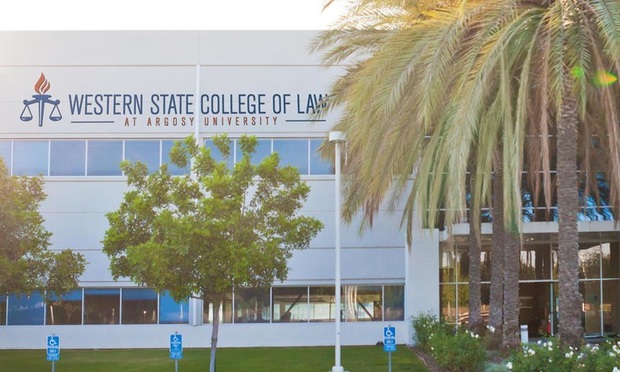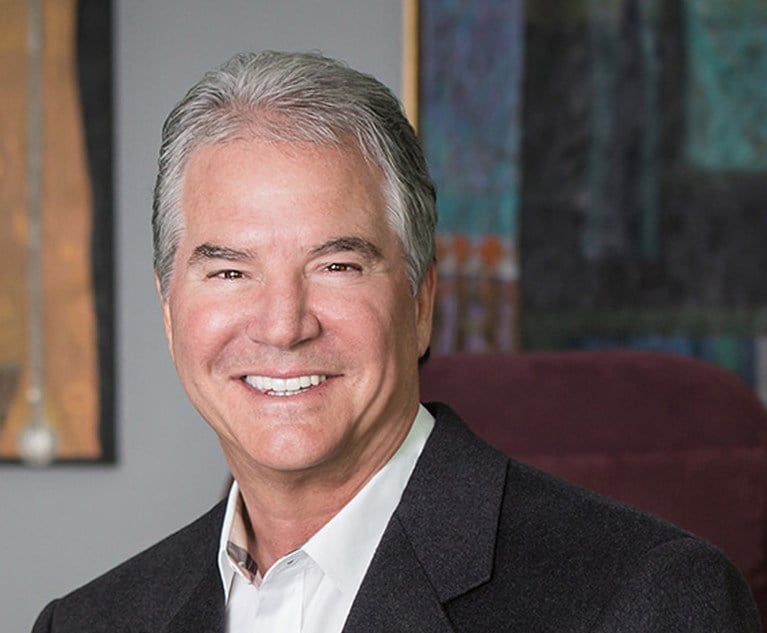A 'Horrific' Spring but Brighter Future for Western State, Law Dean Says
Law Dean Allen Easley discusses pulling the 50-year-old law school back from the brink of closure—and the toll the uncertainty has taken on students and faculty.
August 15, 2019 at 02:07 PM
6 minute read
 Western State College of Law at Argosy University in Irvine, California.
Western State College of Law at Argosy University in Irvine, California.
The past seven months have been an emotional seesaw for Allan Easley and the students, faculty and staff at Western State College of Law in Orange County, where he is dean.
The school’s future was cast into uncertainty in January, when its owner Argosy University was placed under a federal receivership and the campus lost it eligibility for federal student loans. The 50-year-old law school appeared poised to shut down, joining the ranks of five other law schools recently closed or soon to close. But Western State was thrown a lifeline by Westcliff University—a for-profit institution based in Irvine—which agreed to purchase the law school for $1 and keep the doors open.
A federal judge in Ohio approved the purchase agreement earlier this month, though the transfer is still awaiting the blessing of both the American Bar Association and the Western Association of Schools and Colleges. The tentative deal means current Western State students may complete their degrees, with classes resuming Aug. 21. And if all goes well with accreditors, Western State will remain open for the long term. Law.com caught up with Easley this week to discuss the toll the upheaval has taken on faculty and students and what the future looks like for Western State. His answers have been edited for length and clarity.
 Allen Easley.
Allen Easley.Tell me what things have been like at the school since Western State came under the receivership? Last semester was horrific for the students because of the combination of not being sure we’d be allowed to finish the semester, and students not getting their financial aid disbursements. There are lots of students in serious financial distress. We did reach a point where it became clear that we could at least finish the semester and people wouldn’t lose all the work they were doing in the spring. But it didn’t eliminate the financial stress. That was always there. For faculty and staff, they had their own stress caused by the fact that they weren’t sure whether their jobs would continue and whether they would be able to help students finish the program. All of us cared most about figuring things out for the students.
What’s the current financial aid situation? The spring financial aid—it’s too late. There’s nothing we can do about that. The loans were cancelled. It’s not that students borrowed money they have to pay back. Those loans were cancelled. And we cancelled their tuition payments. With the absence of loans, they didn’t have to find another way to pay tuition. But that still left them with rent and food, and gas. That was a hardship. Some students dropped out so they could work and make ends meet while they waited to see what would happen to us. Some moved from full time to part time so they had more time to work.
Post Aug. 1, we’re being operated by Westcliff. We’ve posted a fall schedule. We’ve had students registering for classes for the past couple weeks. They will be able to receive financial aid for the fall through the auspices of Westcliff University. Going forward, things should be much more normalized for the students coming back. But it doesn’t fix the spring.
What has all this meant for the faculty and staff? On one day, we lost half of our staff—not the faulty part. All of that was designed by the receiver to try to make it easier to make payroll. We’re just now beginning to rebuild the staff. We figured out how to operate with dramatically reduced staff through the spring to get things done, but you can’t operate that way long term. That was just an emergency circumstance.
Western State is currently operating under a teach-out plan, which is usually reserved for schools that are closing. Tell me more about that. Because of the length of time it takes for the accrediting agencies [the ABA and WASC] to approve the change of ownership, that would have taken us into the fall semester. So we created—and Westcliff committed to—a two-phase plan. Phase one is that Westcliff agreed to complete the education of our current students as essentially a teach out. The ABA and WASC were able to approve that very quickly. That’s why we are able to start classes this fall and give students access to financial aid.
Because it’s a teach out, it means we can’t yet recruit new students. We don’t have a new entering class this fall. We just have the returning students. Once the ABA and WASC agree to the change in ownership—it’s on the agenda of the ABA’s Council in November—then we can begin to recruit new students. So the earliest we will be able to bring in new students is the fall of 2020.
How many students are you expecting to return? Right now, we have about 230 students registered that are expected to start classes next week. Last fall, we had 415 students, roughly. So the drop is the product of students graduating in May, and we have not replaced them with new students this fall because we’re in a teach-out phase. On top of that, we’ve had some students we lost to transfers to other schools. We knew we wouldn’t be anywhere near 400. We’re happy with the number we have.
Will you reduce the size of the faculty? A number of faculty members, because of all the uncertainty, were looking at other options and decided to do that. The faculty shrunk through that natural attrition. We’re hoping that some of those people who decided to go to other places are people we can bring back in the future. It’s probably three or four years out, though. With no entering class this fall, that means, necessarily, over the next three years we’ll be missing a cohort of students.
How are you feeling about Western State’s prospects? We celebrated our 50th commencement ceremony last May. It was a little bittersweet because we weren’t sure if it would be the 50th of 100, or if it would be the last one. We’ve had an important impact on the Orange County legal community, and I hope if everything works according to plan, that some dean—it won’t be me, clearly—50 years from now will have the opportunity to help Western State celebrate its 100th anniversary.
This content has been archived. It is available through our partners, LexisNexis® and Bloomberg Law.
To view this content, please continue to their sites.
Not a Lexis Subscriber?
Subscribe Now
Not a Bloomberg Law Subscriber?
Subscribe Now
NOT FOR REPRINT
© 2025 ALM Global, LLC, All Rights Reserved. Request academic re-use from www.copyright.com. All other uses, submit a request to [email protected]. For more information visit Asset & Logo Licensing.
You Might Like
View All
Lawsuit accuses University of California of racial discrimination in admissions
3 minute read
Assessing the Second Trump Presidency’s Impact on College Sports


LSAT Administrator Sues to Block AI Tutor From Using ‘Famous, Distinctive’ Test Prep Materials
3 minute readTrending Stories
- 1Pistachio Giant Wonderful Files Trademark Suit Against Canadian Maker of Wonderspread
- 2New York State Authorizes Stand-Alone Business Interruption Insurance Policies
- 3Buyer Beware: Continuity of Coverage in Legal Malpractice Insurance
- 4‘Listen, Listen, Listen’: Some Practice Tips From Judges in the Oakland Federal Courthouse
- 5BCLP Joins Saudi Legal Market with Plans to Open Two Offices
Who Got The Work
J. Brugh Lower of Gibbons has entered an appearance for industrial equipment supplier Devco Corporation in a pending trademark infringement lawsuit. The suit, accusing the defendant of selling knock-off Graco products, was filed Dec. 18 in New Jersey District Court by Rivkin Radler on behalf of Graco Inc. and Graco Minnesota. The case, assigned to U.S. District Judge Zahid N. Quraishi, is 3:24-cv-11294, Graco Inc. et al v. Devco Corporation.
Who Got The Work
Rebecca Maller-Stein and Kent A. Yalowitz of Arnold & Porter Kaye Scholer have entered their appearances for Hanaco Venture Capital and its executives, Lior Prosor and David Frankel, in a pending securities lawsuit. The action, filed on Dec. 24 in New York Southern District Court by Zell, Aron & Co. on behalf of Goldeneye Advisors, accuses the defendants of negligently and fraudulently managing the plaintiff's $1 million investment. The case, assigned to U.S. District Judge Vernon S. Broderick, is 1:24-cv-09918, Goldeneye Advisors, LLC v. Hanaco Venture Capital, Ltd. et al.
Who Got The Work
Attorneys from A&O Shearman has stepped in as defense counsel for Toronto-Dominion Bank and other defendants in a pending securities class action. The suit, filed Dec. 11 in New York Southern District Court by Bleichmar Fonti & Auld, accuses the defendants of concealing the bank's 'pervasive' deficiencies in regards to its compliance with the Bank Secrecy Act and the quality of its anti-money laundering controls. The case, assigned to U.S. District Judge Arun Subramanian, is 1:24-cv-09445, Gonzalez v. The Toronto-Dominion Bank et al.
Who Got The Work
Crown Castle International, a Pennsylvania company providing shared communications infrastructure, has turned to Luke D. Wolf of Gordon Rees Scully Mansukhani to fend off a pending breach-of-contract lawsuit. The court action, filed Nov. 25 in Michigan Eastern District Court by Hooper Hathaway PC on behalf of The Town Residences LLC, accuses Crown Castle of failing to transfer approximately $30,000 in utility payments from T-Mobile in breach of a roof-top lease and assignment agreement. The case, assigned to U.S. District Judge Susan K. Declercq, is 2:24-cv-13131, The Town Residences LLC v. T-Mobile US, Inc. et al.
Who Got The Work
Wilfred P. Coronato and Daniel M. Schwartz of McCarter & English have stepped in as defense counsel to Electrolux Home Products Inc. in a pending product liability lawsuit. The court action, filed Nov. 26 in New York Eastern District Court by Poulos Lopiccolo PC and Nagel Rice LLP on behalf of David Stern, alleges that the defendant's refrigerators’ drawers and shelving repeatedly break and fall apart within months after purchase. The case, assigned to U.S. District Judge Joan M. Azrack, is 2:24-cv-08204, Stern v. Electrolux Home Products, Inc.
Featured Firms
Law Offices of Gary Martin Hays & Associates, P.C.
(470) 294-1674
Law Offices of Mark E. Salomone
(857) 444-6468
Smith & Hassler
(713) 739-1250






